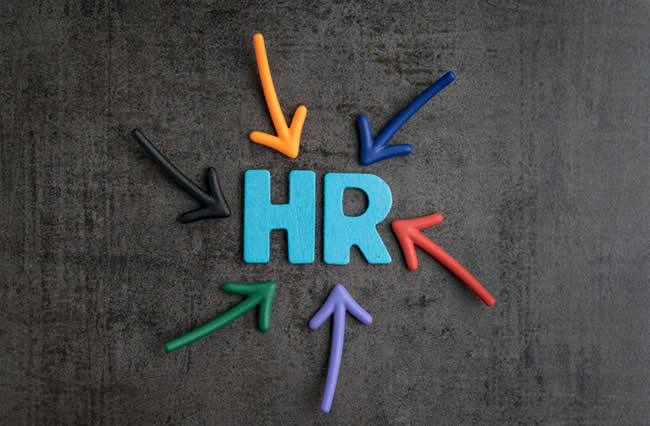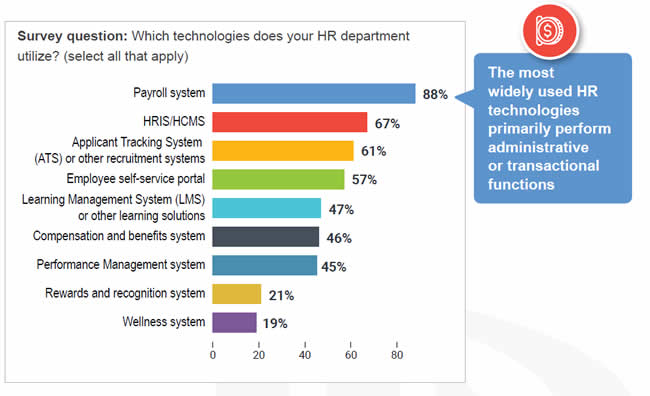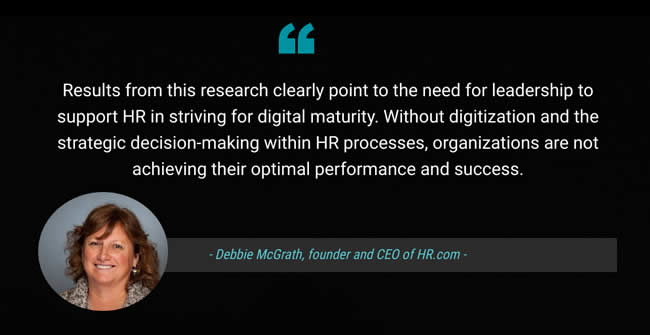HR plays a vital role in digital transformation. At the same time, and as a consequence of digitalization, HR is evolving with digital tools and data analytics enabling the human resources department to fulfill its several roles, such as talent management, better. Yet, digital HR maturity is far from adequate to support HR in its transformation efforts.
In ‘digital HR’ departments, top leaders are more likely to focus on strategic talent management.
Attracting, recruiting, retaining, and developing the right talent in areas where skills are missing is one essential component of the traditional HR tasks: talent management. It’s easy to see why there is so much focus on this aspect. If we can believe the numbers, there is quite some retraining and upskilling to do for years to come, and a talent/skills shortage exists in multiple areas.

Moreover, a new generation has entered the workforce whereby talent retention is clearly under pressure. In an interview on building systems integration with Jeff Groat of Wadsworth Solutions, for instance, BMS system expert Martin Feder mentioned Generation Z and how it gets harder for businesses to engage and retain people in the organization as an inflection point for his industry.
For organizations it becomes ever more important to anticipate talent management challenges and even buildings play a role here: smart offices – and hybrid working models – are ways for organizations to attract new talent indeed. It’s partially what the whole future of work debate is all about.
Converging technologies often also lead to new HR challenges. In many industries where digitalization is high, there’s the need to have different teams collaborate (not to mention different generations) where collaboration didn’t exist before. That’s what convergence does for you. One example: the need for IT (information technology) and OT (operational technology) teams to work together in the scope of Industry 4.0. And it’s certainly not just there.
HR departments may be struggling to emerge from the traditional responsibilities of handling administrative tasks.
HR transformation and the impact of digital transformation on HR
While digital transformation impacts HR, HR transformation happens in several ways as well: from the attraction and recruiting stages in talent management to automating HR processes and working in a more data-driven approach, with analytics facilitating essential decisions.
In practice, however, most digital HR efforts are rather fundamental (yet, crucial). In HR, just as in other functions, there are still archaic processes and systems, often hard to integrate, that lead to errors, wasted time/costs, and unhappy employees. We’re indeed talking about some of the payroll systems out there, simply because payroll applications are the most adopted digital HR tools and because getting paid on time, without errors and HR staff suffering from inadequate systems, seems to be quite fundamental.
HR transformation and the impact of digital transformation on HR is a multi-faceted given that touches many aspects. Change management. Culture. Responding to changing needs of younger generations. Focusing on employee satisfaction and the employee experience that has a direct correlation with the customer experience. Making sure people get what is contractually guaranteed in time, on top of salaries. Employee wellness. Communication. Means to collaborate. The list of challenges and tasks for HR is pretty long and it’s certainly not just about talent management.
Although in some regions and countries, there have been some significant digitization and streamlining efforts in recent years (with personal data protection rules as a driver in the EU) and several organizations have quite innovative ways in their digital HR approach, overall HR transformation lags.
Digital HR departments tend to operate in organizations that are realizing better financial and HR results.
One of the reasons might be the fact that the attention for HR – and hiring – is lower in some countries where there is a darkening mood and less appetite for risks among CFOs. Economic uncertainties, due to well-known reasons, have a negative impact on the hiring outlook, and cutting costs ranks high to the highest of the CFO’s agenda. No wonder that automation, here mainly robotic process automation or RPA, is so popular – obviously one element of HR transformation on its own.
Still, no matter how you turn it, there’s only so much you can automate, and the capability to have the right people at the right place with the proper care remains vital for organizations that want to succeed, once these difficult days are over. Only starting to focus more on talent management and attracting, recruiting, and empowering the right staff in better times means lost time and a gap with those that see HR as a vital strategic role for the longer term today.
Talent management requires analytics but digital HR maturity remains low
One would expect that technology is intensively used to make sure HR is equipped to avoid unnecessary costs and have the knowledge to make the right decisions to optimize performance (not the same as having staff work more) and even foresee significant challenges ahead regarding talent management.
Only 19% agree that their HR departments use data for predictive analytics to anticipate talent management challenges.
Data and analytics are essential here, and when it boils down to those forecasts, we’re talking predictive analytics. Yet, here too in reality, the adoption of such techniques is low.
Another main reason probably is because the role of HR is still seen too much as administrative, rather than strategic. That’s a mistake. Sure, with all the talk about automation and digital technologies, it’s easy to forget the importance of human resources and talent management. Sure, HR has administrative tasks, with HR administration being the most obvious one. And, yes, also in talent management, workforce management, and HR service delivery, there are administrative aspects. Yet, the importance of all these other HR responsibilities on realizing strategic goals, and even their strategic nature as such, are evident.

Making sure staff disposes of the right information at the right time, communication channels are open and functioning, salaries are paid in time, safety is ensured, dissatisfaction can be voiced and productivity is optimal (taking into account employee wellness), staff is trained to better use tools, deal with data in compliant ways, the list goes on: having all this right is simply essential to have a work culture where productivity and satisfaction can reflect on the bottom-line where we meet the CFO again but also ample technological enablers in the broader field of digital HR.
The strategic role of HR and top leadership priorities – digital HR transformation hurdles
The fact that HR is still mainly seen as administrative is reflected in a study by HR.com’s Research Institute, whereby 70 percent of participants selected ‘administrator’ when asked about their role.
Or, as the announcement puts it: “HR departments may be struggling to emerge from the traditional responsibilities of handling administrative tasks as the most common role played by HR is as an HR administrator (70%), while only 30% of HR departments play the role of strategist”. It’s a worrying sign that also might explain other results from the study that indicated digital HR is not adopted as one might expect, given all the mentioned – and several other – evolutions, as well as reported benefits of those that are a bit further ahead.
Fifty-five percent of respondents say they serve as a business partner in the organization, 50 percent also say HR plays the role of compliance expert, 48 percentage points to an employee advocate role, and only 42 percent cite a role as a talent management expert. Nore: respondents had to pick the top four roles played by HR in their organization (so they selected up to four answers).
The different roles played by HR impact the digital transformation processes. HR departments with most focus on administrative functions will likely not be those leading these processes.
Per the study (based on a survey with 353 participants), most HR departments are digitalizing, and almost two-thirds of HR professionals believe their HR department will become much more digital over the next two years.
Today, 33 percent say that in their department, “many things are digital” and 7 percent that “virtually everything is digital”. Looking closer at why digital HR technologies, certainly those that can make a significant difference whereby analytics are again essential, aren’t picking up faster the priorities of executives might be important.
Quote: “Top leaders are not focused on long-term strategic management issues. HR professionals are most likely to say that top leaders are focused on two issues: employee productivity (51%) and compliance (41%)“. Engagement ranks third (36%), followed by development (25%), workforce planning (important for productivity), and well-being (both 22% of respondents).

As HR.com reminds, ‘the problem of focusing exclusively on productivity and utilization is that these metrics represent a management goal rather than a management practice.’ In other words: what is leading to higher productivity, and do leaders pay the right attention to that?
In the context of digital transformation, this finding: less than half (45%) indicate their organization promotes a culture of innovation and change. Underestimating the strategic importance of HR and a gap with leadership seem to be the key challenges at hand for meaningful HR transformation from the digital HR technology perspective.
More results, advice, explanations, and an overview of the technologies which HR departments deploy today as in the illustration above, in the full study, entitled ‘The Digital HR Function – Boost HR productivity and efficiency by adopting digital transformation.’
Results were analyzed by the level of digital maturity of each organization to study the differences between companies primarily using automated processes and those that still mainly use manual processes in the workplace. All pictures courtesy of their mentioned owners; source picture Debbie McGrath; top illustration Shutterstock – Copyright: eamesBot

